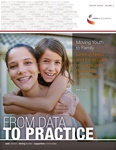How can child welfare leaders and providers reimagine support for children and families?
David Sanders discusses how child protection agencies and providers can move upstream to provide proactive support for families.
David Sanders discusses how child protection agencies and providers can move upstream to provide proactive support for families.
Learn how child protection agencies in New Jersey, Oklahoma, and Washington recruit and retain resource families for children in foster care.
Explore effective strategies that child protection agencies can use to recruit and retain traditional and therapeutic resource families.
Learn about some of the strategies that are effective in securing permanent adoptions among older youth.
Explore strategies that support keeping siblings together in foster care and in permanent families to better support their well-being.
Learn from a study that examines how requiring child support payments to child protection agencies can impact time to permanency.
Learn from a study that explores how mandatory reporting laws may discourage survivors of intimate partner violence from seeking support.

Our 2020 special report highlights how communities are innovating to respond to the tremendous impact of COVID-19 on children and families.

This report explores permanency outcomes for youth who, when referred to Casey services, were not residing with a family member.
Behavioral science offers ideas to improve the recruitment process for foster and adoptive parents in child welfare.